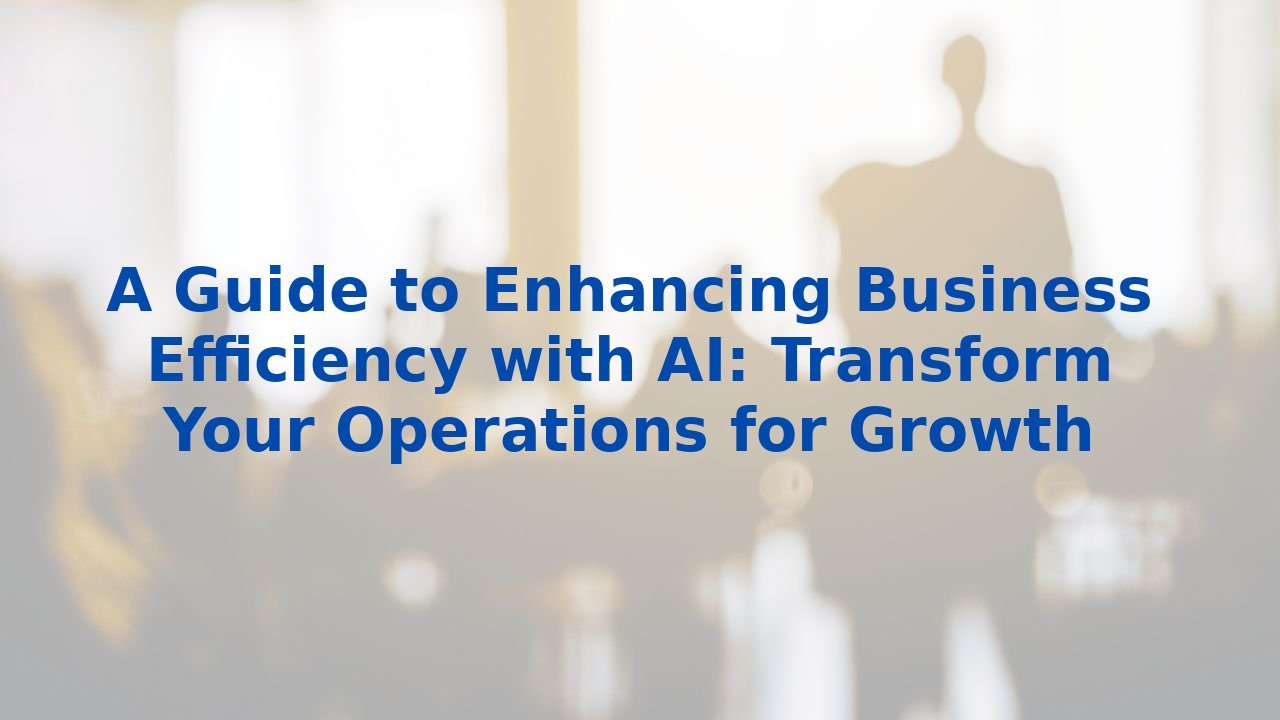A Guide to Enhancing Business Efficiency with AI: Transform Your Operations for Growth
Enhancing Business Efficiency with AI: A Guide for Growing Your Organization
In a world that never stops moving, the quest for efficiency has never been more critical. The integration of Artificial Intelligence (AI) into business operations can act as a catalyst for transformation, driving not only growth but also resilience. This guide will outline how AI can enhance various business processes and ultimately improve the overall efficiency of your organization.
1. Automating Routine Tasks
One of the hallmark advantages of AI is its unparalleled ability to automate repetitive tasks. Imagine freeing your team from tedious activities like data entry, invoice processing, or appointment scheduling. With AI-driven bots and software, your workflows can become remarkably streamlined. The result? Accelerated processes and a drastic reduction in human error, allowing your team to dedicate their talents toward strategic and innovative endeavors that propel growth.
2. Process Optimization
At the heart of operational efficiency lies process optimization. AI excels in analyzing workflows to identify bottlenecks, redundancies, and inefficiencies. By offering insightful data, AI empowers organizations to restructure processes, automate manual tasks, and reallocate resources, leading to a leaner and more effective operational model. This not only enhances productivity but positions businesses to adapt quicker to changing market dynamics.
3. Quality Control and Assurance
In today’s competitive landscape, maintaining quality is non-negotiable. AI-driven quality control systems monitor manufacturing processes in real-time, ensuring that only products meeting stringent standards reach customers. This proactive approach to quality management mitigates potential defects early in the production line, enhancing the overall quality of goods, reducing waste, and bolstering your brand’s reputation.
4. Risk Management
Navigating the complexities of business risks requires foresight and insight. AI provides a robust framework for risk management by analyzing vast datasets to uncover intricate relationships and trends. It identifies emerging risks, assesses market volatility, and predicts future scenarios, enabling businesses to proactively mitigate risks while capitalizing on new opportunities.
5. Supply Chain Management
The modern supply chain demands precision and adaptability. AI aids organizations in achieving these goals by analyzing both historical and real-time data. This enables businesses to anticipate demand fluctuations, optimize inventory levels, and propose efficient shipping routes. As a result, delays are minimized, carrying costs are reduced, and supply chains operate with newfound efficiency.
6. Business Process Automation
AI business process automation (BPA) is a transformative approach reshaping productivity paradigms. By automating routine tasks, businesses benefit from reduced costs and improved decision-making capabilities. Coupled with advanced analytics, AI BPA brings timely insights to the forefront, facilitating informed decision-making. This empowerment not only enhances productivity but enriches customer satisfaction.
7. Predictive Analytics and Personalization
AI's prowess in data handling allows organizations to make informed, strategic decisions. Predictive analytics harnesses enormous data volumes to forecast future trends, allowing businesses to stay one step ahead. Furthermore, AI enables personalized customer experiences by analyzing preferences and behaviors, ultimately fueling better product development and customer service strategies.
8. Employee Productivity Enhancement
AI doesn't just automate tasks; it significantly enhances employee productivity. By providing intelligent tools, such as virtual assistants for scheduling and prioritizing tasks, employees can concentrate on high-value activities that require creativity and critical thinking. This shift not only elevates overall productivity but also enhances job satisfaction as employees engage in more meaningful work.
The Importance of Training Employees for AI
As transformative as AI can be, its success hinges on the competency of the workforce that utilizes it. Training employees in basic AI concepts and its practical applications within your organization is crucial. This training should foster:
- Understanding AI Basics: Familiarize employees with how AI functions and its potential impact on their roles.
- Collaboration Skills: Encourage developing skills that will enable seamless collaboration with AI systems.
- Adaptability: Equip teams to be adaptable to new technologies for smooth AI integration.
- Continuous Learning: Implement regular training sessions to keep employees updated on the evolving role of AI in business.
By investing in employee training initiatives, organizations can unlock the full potential of their AI integration, thereby achieving a smoother transition to more efficient operations.
Conclusion
The integration of AI into business processes isn't merely a trend; it's a transformation journey toward enhanced efficiency and growth. From automating routine tasks to optimizing processes, managing risks, and enriching employee productivity, AI is a versatile asset that can elevate any organization. Moreover, fostering a well-trained workforce that can leverage AI effectively is paramount to maximizing its benefits. In a world buzzing with possibilities, now is the time to embrace AI as an integral part of your operational strategy to drive long-term success.



